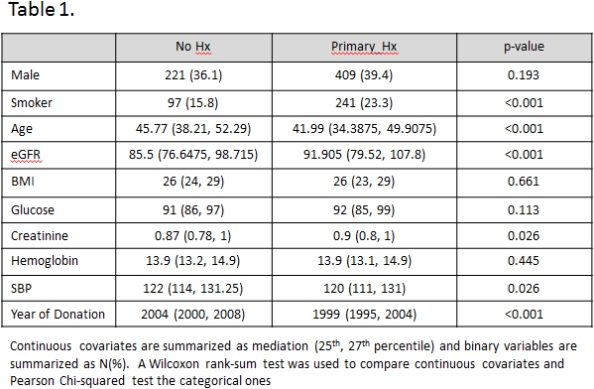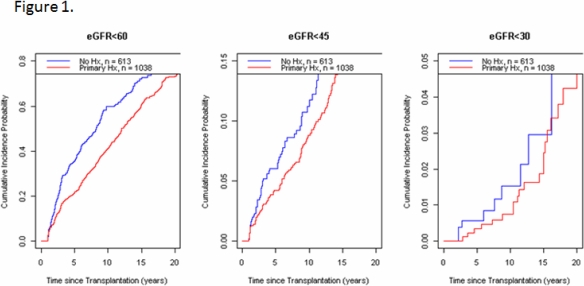Impact of Donor-Recipient Relationship on Development of CKD.
A. Matas, D. Vock, H. Ibrahim.
UMN, Mpls, MN.
Meeting: 2016 American Transplant Congress
Abstract number: 53
Keywords: Donors, Kidney, Outcome, Renal function, unrelated
Session Information
Session Name: Concurrent Session: Living Kidney Donation: Risk Factors for Adverse Long term Outcome
Session Type: Concurrent Session
Date: Sunday, June 12, 2016
Session Time: 2:30pm-4:00pm
 Presentation Time: 3:30pm-3:42pm
Presentation Time: 3:30pm-3:42pm
Location: Veterans Auditorium
Two studies have reported a small increase of ESRD in LDs compared to healthy matched controls. However, the majority of ESRD has been in relatives (vs unrelated donors) (also true at our center). Relatives of those with ESRD have higher risk of ESRD (w/o/ being donors). ESRD is still a rare event after donation. We studied impact of family Hx of ESRD on the more common (and earlier postdonation) event of developing CKD. Time from donation to first eGFR, 60 (CKD stage 3a), <45 (stage 3b), and <30 (Stage 4) were determined in 2 Caucasian groups: a) first degree relatives plus others who had a 1st degree relative with Hx of kidney disease, and b) all others. Because LURD was not common until 90s, we limited analyses to donation after 12/31/89; and thru 12/31/13. Of 1651 donors, 1038 had a 1st degree relative with ESRD. Figure 1 shows the unadjusted cumulative probability of developing CKD stages by family history of kidney disease. However, there are significant differences in clinical factors between the two groups (Table 1). Therefore, we modeled the impact of having a 1st degree relative with family hx of kidney disease, while adjusting for eGFR, BMI, systolic blood pressure, hemoglobin, glucose at donation, gender, smoking status, and calendar time of transplant. Family history of kidney disease was associated with a small but NS increased risk of developing CKD Stage 3a (HR = 1.12, p=0.12); stage 3B (1.23, p=0.19); stage 4 (1.07, p=0.88). We then modeled, using a pooled analysis with the same adjustment factors, the hazard of developing the next stage of CKD. Those with a 1st degree relative had 13.2% ↑ (95% CI, -1.1, +29.6) (p=0.07). We conclude that although the majority of reported ESRD after donation has been in 1st degree relatives, there is only a small and NS ↑ in development of CKD between 1st degree relatives and other donors.


CITATION INFORMATION: Matas A, Vock D, Ibrahim H. Impact of Donor-Recipient Relationship on Development of CKD. Am J Transplant. 2016;16 (suppl 3).
To cite this abstract in AMA style:
Matas A, Vock D, Ibrahim H. Impact of Donor-Recipient Relationship on Development of CKD. [abstract]. Am J Transplant. 2016; 16 (suppl 3). https://atcmeetingabstracts.com/abstract/impact-of-donor-recipient-relationship-on-development-of-ckd/. Accessed July 18, 2025.« Back to 2016 American Transplant Congress
